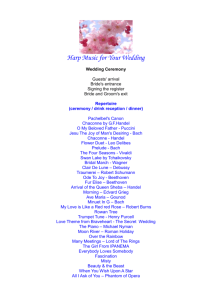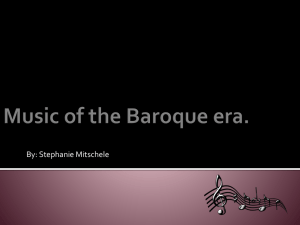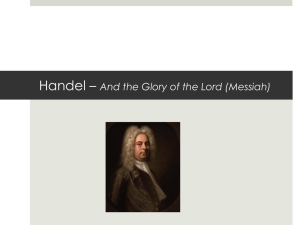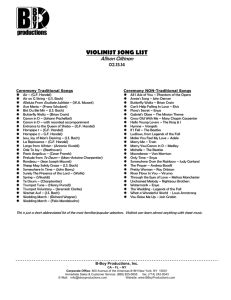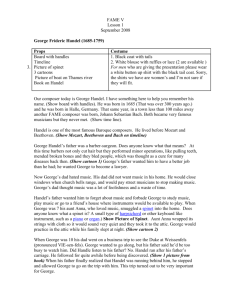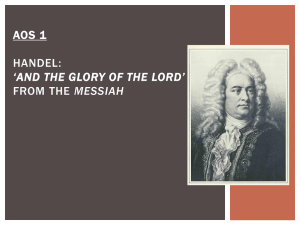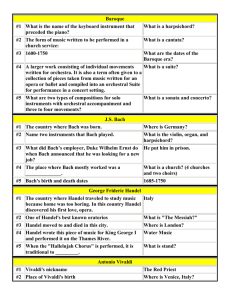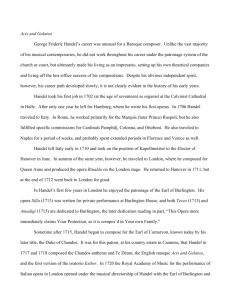APPENDIX 7 - Neil Jenkins Information Website
advertisement
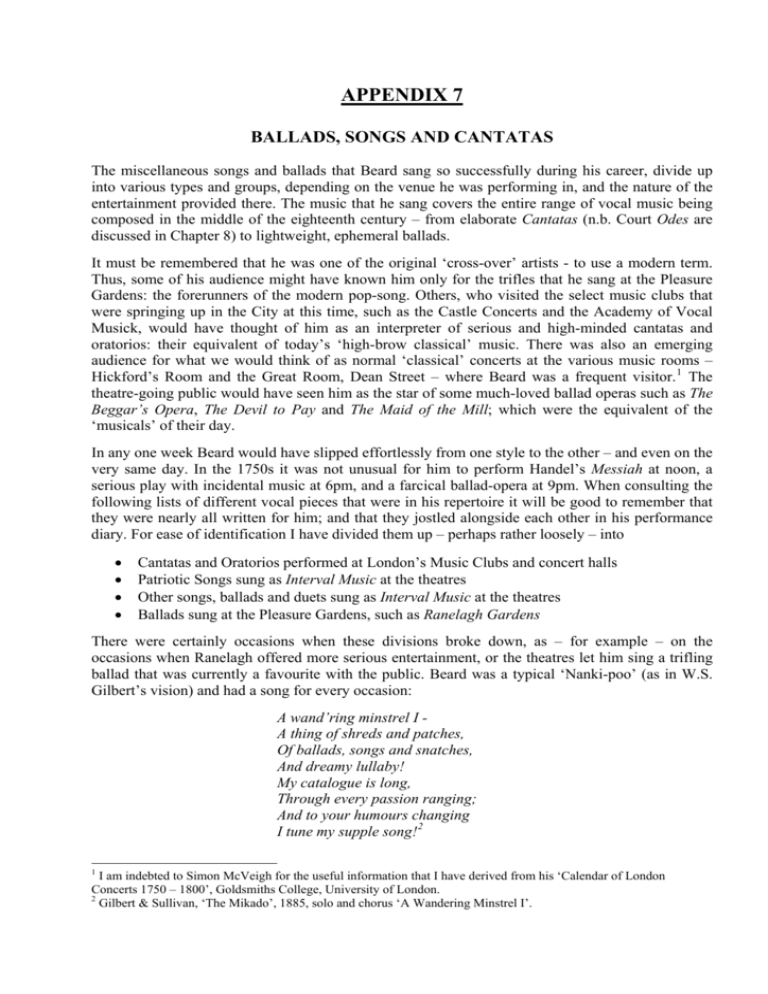
APPENDIX 7 BALLADS, SONGS AND CANTATAS The miscellaneous songs and ballads that Beard sang so successfully during his career, divide up into various types and groups, depending on the venue he was performing in, and the nature of the entertainment provided there. The music that he sang covers the entire range of vocal music being composed in the middle of the eighteenth century – from elaborate Cantatas (n.b. Court Odes are discussed in Chapter 8) to lightweight, ephemeral ballads. It must be remembered that he was one of the original ‘cross-over’ artists - to use a modern term. Thus, some of his audience might have known him only for the trifles that he sang at the Pleasure Gardens: the forerunners of the modern pop-song. Others, who visited the select music clubs that were springing up in the City at this time, such as the Castle Concerts and the Academy of Vocal Musick, would have thought of him as an interpreter of serious and high-minded cantatas and oratorios: their equivalent of today’s ‘high-brow classical’ music. There was also an emerging audience for what we would think of as normal ‘classical’ concerts at the various music rooms – Hickford’s Room and the Great Room, Dean Street – where Beard was a frequent visitor. 1 The theatre-going public would have seen him as the star of some much-loved ballad operas such as The Beggar’s Opera, The Devil to Pay and The Maid of the Mill; which were the equivalent of the ‘musicals’ of their day. In any one week Beard would have slipped effortlessly from one style to the other – and even on the very same day. In the 1750s it was not unusual for him to perform Handel’s Messiah at noon, a serious play with incidental music at 6pm, and a farcical ballad-opera at 9pm. When consulting the following lists of different vocal pieces that were in his repertoire it will be good to remember that they were nearly all written for him; and that they jostled alongside each other in his performance diary. For ease of identification I have divided them up – perhaps rather loosely – into Cantatas and Oratorios performed at London’s Music Clubs and concert halls Patriotic Songs sung as Interval Music at the theatres Other songs, ballads and duets sung as Interval Music at the theatres Ballads sung at the Pleasure Gardens, such as Ranelagh Gardens There were certainly occasions when these divisions broke down, as – for example – on the occasions when Ranelagh offered more serious entertainment, or the theatres let him sing a trifling ballad that was currently a favourite with the public. Beard was a typical ‘Nanki-poo’ (as in W.S. Gilbert’s vision) and had a song for every occasion: A wand’ring minstrel I A thing of shreds and patches, Of ballads, songs and snatches, And dreamy lullaby! My catalogue is long, Through every passion ranging; And to your humours changing I tune my supple song! 2 1 I am indebted to Simon McVeigh for the useful information that I have derived from his ‘Calendar of London Concerts 1750 – 1800’, Goldsmiths College, University of London. 2 Gilbert & Sullivan, ‘The Mikado’, 1885, solo and chorus ‘A Wandering Minstrel I’. Cantatas, Oratorios, and excerpts from them, sung at London’s Music Clubs, Theatres, and concert halls ‘Decayed Musicians Fund’ Benefit Concert Various Venues – mainly King’s Theatre April 10th, 1745 April 16th, 1751 March 23rd, 1752 April 30th, 1753 February 28th, 1754 February 17th, 1755 April 5th, 1756 February 2nd, 1759 March 12th, 1761 Handel ‘Total Eclipse’ (Samson) Handel ‘Why does the God of Israel sleep’ (Samson) Handel ‘The flocks shall leave the mountains’ (Acis & Galatea) Handel ‘Why does the God of Israel sleep’ (Samson) Handel ‘Tune your harps’ (Esther) Handel ‘Through the land so lovely blooming’ (Athalia) Handel ‘The trumpet’s loud clangour’ (St Cecilia Ode) Handel ‘Love in her eyes’ (Acis & Galatea) Handel ‘The flocks shall leave the mountains’ (Acis & Galatea) Maurice Greene ‘O lovely Fair’ & ‘Faithful Youth’ Handel ‘The flocks shall leave the mountains’ (Acis & Galatea) Handel ‘Endless Pleasure’ (Semele) Nicolo Pasquali ‘O ‘Tis Elysium All’, (Cantata ‘Celia’) Arne Cantata ‘Cymon & Iphigenia’ Beard may have withdrawn: his name disappears from the advertisements Arne Alfred (‘Alfred’) Samuel Howard ‘When Bacchus, jolly God’ Lock Hospital Benefit April 22nd, 1752 May 7th, 1753 ? May 23rd, 1754 May 4th, 1759 May 18th, 1762 April 15th, 1763 February 29th, 1764 February 13th, 1765 Various Venues Purcell ‘Ye twice ten hundred Deities’ (The Indian Queen) Handel ‘Through the land so lovely blooming’ (Athalia) composer? ‘Beneath this’ (Cantata) Handel ‘The flocks shall leave the mountains’ (Acis & Galatea) Handel Judas Maccabaeus Handel L’Allegro ed il Penseroso + St Cecilia Ode Handel arias (which? – no information in advert) Sacred Music from Handel Oratorios Avison & Giardini Ruth Arne Judith Avison & Giardini Ruth (Beard may have withdrawn from this and been replaced by Vernon) The Smallpox Hospital March 3rd, 1753 Handel Alexander’s Feast (conductor J. Stanley) The Westminster Hospital April 10th, 1755 May 15th, 1755 Songs (for the Feast Day Celebrations) Songs (at St. Anne’s Church Westminster) The Middlesex Hospital April 26th, 1758 Handel Anthems (at St. Anne’s Church Westminster) City of London, Lying-In Hospital for Married Women, Benefit May 12th, 1753 May 16th, 1759 Arne Alfred (‘Alfred’) Handel arias (at St. Andrew’s, Holborn) Great Room Dean Street March 5th, 1753 February 22nd, 1754 February 1st, 1757 March 31st, 1758 April 1st, 1758 March 1st, 1759 Handel arias from Samson (Benefit for John George Freake) Barbandt ‘Psalm 51’ + oratorio excerpts Handel L’Allegro ed il Penseroso (Benefit for Mrs Pontifex) Handel Acis and Galatea (Benefit for Mrs Abegg) Handel Acis and Galatea (Benefit for a Widow in great distress) Handel L’Allegro ed il Penseroso Crown Tavern, Academy of Ancient Musick January 18th, 1739 Handel Alexander’s Feast (Tenor solos) Crown Tavern, St Cecilian Society October 21st, 1755 October 28th, 1755 Handel Acis and Galatea (Acis) Handel Acis and Galatea (Acis) The Crown and Anchor March 21st, 1744 Defesch Love and Friendship The Devil Tavern, Apollo Society April 16th, 1736 Boyce David’s Lamentation over Saul and Jonathan King’s Theatre Haymarket April 29th, 1745 ? April 25th, 1754 Cantata by Stanley (Benefit for Mrs Robinson) + Handel Trio (Acis & Galatea) Handel L’Allegro ed il Penseroso (Benefit for Frasi) Little (New)Theatre Haymarket April 6th, 1749 April 23rd, 1751 April 2nd, 1753 ? May 2nd, 1757 Handel Acis and Galatea (Benefit for Frasi) Handel ‘Happy Pair’(Alexander’s Feast)(Benefit for Jonathan Snow) + Handel Trio (Acis & Galatea) Handel Acis and Galatea (Benefit for Frasi) Handel Acis and Galatea (Benefit for Jonathan Snow) Castle Tavern, Castle Music Society Concerts April 5th, 1749 May 3rd, 1749 Handel Acis and Galatea Handel Esther (conductor J. Stanley) March 16th, 1751 October 23rd, 1751 January 20th, 1752 January 27th, 1752 Handel Samson Handel Acis and Galatea ? ? Castle Music Society, at Haberdasher’s Hall* th 1st night October 19 , 1757 Pasquali, ‘O ‘Tis Elysium All’, (Cantata ‘Celia’) + Howard, ‘Ye cheerful Virgins’& ‘When Bacchus, jolly God’ st 9th night December 21 , 1757 Handel, ‘Comfort Ye’ & ‘Every Valley’ (Messiah) + Arne, ‘The Woodlark whistles thro’ the Grove’ (Eliza) + Boyce, Duet ‘Thou soft invader of the Soul’ (Solomon) th 15th night February 16 , 1758 Arne, Cantata ‘Frolic and free’ + Purcell, ‘Ye twice ten hundred deities’ (The Indian Queen) * Beard may have taken part in more of these Concerts. The programmes are extant for the first, ninth, and fifteenth nights only of the 1757-8 season. “The printed programmes provide important information about the Society. They confirm that the evening’s music was divided into two parts. More importantly, the choice of music and the calibre of soloists such as Beard and Frasi disclose the tone and the standard the society sought to achieve”. Brian Cosby RMA Research Chronicle 34 Drury Lane March 28th, 1750 April 11th, 1750 March 4th, 1763 April 27th, 1763 Boyce, Solomon (Benefit for Jones) Sacred Music (Benefit for Geminiani) The Cure of Saul (Handel ‘Pasticcio’ by Dr. Brown) (Benefit for Colleges in Philadelphia & New York) The Cure of Saul (Handel ‘Pasticcio’ by Dr. Brown) (Benefit for Colleges in Philadelphia & New York) Hickford’s Room April 8th, 1736 April 20th, 1736 April 21st, 1749 April 30th, 1751 Songs, for his Benefit. Beard’s 1st Benefit Concert Songs, (Benefit for Rowland) (possibly delayed until May 10th, 1736) Handel Acis and Galatea (Benefit for Miss Oldmixon) Songs, (Benefit for Marianne Davies aged 7) Hickford’s Room: J.C. Smith’s Season of 1740 January 4th, 11th, 18th, 25th, February 1st, 8th April 18th, February 22nd, 29th March 7th, 27th April 2nd, 11th, 25th J.C. Smith Rosalinda J.C. Smith Rosalinda J.C. Smith Rosalinda J.C. Smith David’s Lamentation over Saul and Jonathan J.C. Smith David’s Lamentation over Saul and Jonathan J.C. Smith David’s Lamentation over Saul and Jonathan The Long Room, Hampstead September 21st, 1745 Benefit for Thomas Roseingrave and see: Appendix 1 for Beard’s Benefit Concerts here every August from 1750 - 1761 Patriotic Songs sung as Interval Music at the theatres Composer Title 1st recorded performance War of Jenkins’s Ear 1739 – 42 & War of the Austrian Succession 1740 - 48 Purcell Purcell Handel John Frederick Lampe ? Richard Leveridge To Arms (Bonduca) CG 24.10.39 Britons strike home (Bonduca) “ Nel Pugnar (Arianna in Creta) CG 25. 3. 40 A Song in the character of a Captain of an English “ Man-of-War upon the Taking of Porto Bello (‘Come my lads, with souls befitting’) Black-eyed Susan (‘All in the dawn the fleet was moored’) [Text by John Gay] CG 26.4.40 The Jacobite Rebellion 1744 - 6 Purcell Handel arr. Thomas Arne John Frederick Lampe ? Genius of England (Don Quixote) The Trumpet’s loud Clangour (St Cecilia Ode) God bless our noble King (The National Anthem) A New Occasional Song A New Occasional Ballad (possibly: Handel ‘Stand round, my brave boys’) God save the King (excerpt from ‘Zadok the Priest’) Handel John Frederick Lampe Handel arr. Pepusch The English Hero’s Welcome Home Trio from Acis and Galatea Over the hills and far away ? An Occasional Song on the defeat of the Rebels CG 8.3.44 CG 17.4.44 DL 28.9.45 CG 11.10.45 CG 3.12.45 CG 28.12.45 CG 8.1.46 CG 25.1.46 CG 7.2.46 (with new text: ‘He that is forced to go and fight’) CG 25.4.46 (possibly: Handel ‘From scourging Rebellion’) ? Britannia sees brave William shine CG ? 1746 (A Song in honour of his Royal Highness the Duke of Cumberland) ? A Loyal Song, ‘From barren Caledonian lands’ CG ? 1746 (in praise of the Duke of Cumberland) The Seven Years’ War 1756 - 63 Thomas Arne Purcell ? William Boyce Rule Britannia Britons strike home (Bonduca) A New Song, in the character of a Sailor Heart of Oak (words by Garrick) DL 2.4.55 “ DL 7.10.55 CG 23.4.61 Other songs, ballads and duets sung as Interval Music at the theatres Composer Title Henry Purcell “ “ The Opinion of the Ancients (Duet) Mad Bess (‘From silent shades’) Let Caesar & Urania live (Duet) 1st recorded performance CG 12.4.36 CG 10.3.37 CG 14.3.37 (from: Welcome Song for James II ‘Sound the trumpet, beat the drum’) “ “ “ “ “ “ From rosy bowers (Don Quixote) Celia has a thousand charms (Rival Sisters) Mad Dialogue (Duet) Mad Tom (in character) Mad Bess (‘From silent shades’) (in character) The Incantation Song (The Indian Queen) “ CG 26.3.37 CG 30.11.38 DL 10.12.41 CG 21.4.48 DL 21.3.52 (presumably: ‘Ye twice ten hundred deities’) “ Sing all ye Muses (Don Quixote) (Duet) DL 7.5.57 “ A Solemn Hymn (sung in ‘The Royal Convert’) CG 15.11.62 -----------------------------------------------------------------------------------------------------------------------Samuel Howard As I saw fair Clara (duet) poem by R. Steele CG 15.3.37 (possibly ‘A Song designed for the play The Conscious Lovers’) ? ? ? ? ? ? John Ernest Galliard ? J.C. Pepusch ? G.F. Handel Thomas Arne ? ? ? Thomas Arne Thomas Arne Thomas Arne ? John Stanley Turlough O’Carolan ? G.F. Handel G.F. Handel G.F. Handel Mr Cowley’s ‘Swallow’ A new Trumpet song A Cantata accompanied by Trumpets The Lady’s Lamentation for the loss of Senesino A new English Cantata J’aime la Liberté The Early Horn The Life of a Beau See from the silent Groves Alexis flies Celia that I once was blest O Happy Pair (Alexander’s Feast) Would you taste the noontide air (Comus) The Protestation On, on, my dear Brethren (A Masonic Song) Thus mighty Eastern Kings Cantata Rise, Glory, rise (Rosamond) Was ever Nymph like Rosamond (Rosamond) Song with French Horns Cantata Bumper ‘Squire Jones (‘Ye good fellows all’) Singing in Italian Let me wander not unseen (L’Allegro) Sweet bird (Il Penseroso) Hark, the little warbling choir (presumably CG 18.4.37 CG 25.4.37 CG 28.4.37 CG 2.5.37 CG 18.10.37 CG 17.4.38 CG 3.5.38 CG 13.5.38 CG 17.5.38 CG 6.1.39 CG 3.4.39 “ CG 11.5.39 CG 15.5.39 “ CG 25.4.40 DL 24.10.41 DL 8.12.41 DL 17.2.42 DL 20.3.42 DL 29.3.42 DL 5.4.42 DL 6.4.42 DL 21.4.42 DL 8.10.42 ‘Hush, ye pretty warbling choir’ Acis and Galatea) Thomas Arne Samuel Howard William Boyce William Boyce Distracted I turn (The Judgement of Paris) Stella and Flavia every hour A New Song Together let us rove (duet) Solomon DL 19.10.42 DL 6.4.43 DL 11.5.43 DL 28.3.44 G.F. Handel ? ? Jonathan Martin ? John Frederick Lampe Scotch ballad William Boyce John Stanley John Stanley Maurice Greene? ? Maurice Greene ? ? Thomas Arne William Boyce Thomas Arne Thomas Arne ? ? ? Thomas Arne ? ? ? ? (Scottish song) (‘new set’) Thomas Arne ? ? William Boyce ? ? ? ? William Boyce William Boyce William Boyce ? Thomas Arne A New Song DL 28.3.44 A Bacchanalian two-part song DL 7.4.44 Cantata CG 24.4.44 To thee, O gentle Sleep (Tamerlane) CG 5.11.44 Cantata CG 28.11.44 What d’ye call it CG 4.4.45 We’re gaily yet (The Provok’d Wife) DL 1.5.45 Song of Diana (Secular Masque) CG 13.3.46 ‘With horns and with hounds’ Cantata VII ‘Who’ll buy a Heart’(12 Cantatas) CG 24.4.47 Cantata III ‘Whilst others barter’(12 Cantatas) CG 8.3.48 ‘in the character of Anacreon’ Go lovely rose CG 28.3.48 The famous Song of ‘92’ (Fair Quaker of Deal) CG 13.4.48 [possibly ‘How little do the Landmen know’] Go rose, my Chloe’s bosom Grace CG 27.4.48 A Scotch Cantata DL 6.10.48 Singing instead of the Scotch Cantata DL 2.1.49 A New Cantata DL 21.3.52 Cantata DL 25.4.52 Cantata ‘Cymon and Iphigenia’ DL 27.3.53 Cantata I ‘The School of Anacreon’ “ The Lass of the Mill, ‘Who has e’er been at Baldock’ “ Cantata proper to the play (The Refusal) DL 20.12.53 A favourite French Air DL 19.3.54 A Pastoral Dialogue (Duet) DL 29.3.54 A New Ballad DL 2.5.54 Mary Scot DL 10.5.54 A Scots Cantata “ Hooly and Fairly “ (‘Oh! gin my wife wad drink hooly and fairly’) To thee, O gentle Sleep (Tamerlane) DL 4.11.54 Rule Britannia DL 2.4.55 A New Cantata “ A Tale of a Cock and a Bull: ‘To take in good part, the squeeze of the hand’ DL 30.3.56 An Ode in Commemoration of Shakespeare DL 1.4.56 The Country Wedding:‘a Song from Roger & Joan’ DL 31.3.57 The Toast “ When Phoebus the top of the Hills does adorn (Duet) “ A New Ballad DL 29.3.59 A Bacchanalian Song “ A New Comic Dialogue (Duet) ‘in character’ “ = probably ‘Dialogue of Johnny and Kate’ DL 2.4.59 An Ode in honour of the Anti-Gallicans DL 16.5.59 A Medley Epilogue written by Garrick CG 14.3.61 A Pastoral Dialogue (Duet) (Arcadian Nuptials) CG 19.1.64 Ballads sung at the Pleasure Gardens, such as Ranelagh Gardens Composer Title Reference Songs in the Madden Collection at Cambridge University Library – ‘sung by Mr Beard’; Songs in the University of Birmingham 18th Century Cheap Print index, by Richard Simmons; ? The World in disguise: or Sing tantarara Masques all - A new ballad sung by Mr Beard at the Ball ...at Ranelagh House Thomas Arne The Masquerade Song: ‘Ye medley of mortals’ B Lib.G.314.(24.) William Bates Myrtilla, ‘Ye chearful virgins have ye seen my fair Myrtilla’ William Boyce The Non Pareil (‘Tho’ Chloe’s out of fashion’) William Boyce Hearts of Oak, ‘Come chear up my lads it is to glory we steer’ 5 / 750 Thomas Arne Britons Guardian Angel, ‘Rule Britannia’ 4 / 217 Thomas Arne The Beer-Drinking Britons, ‘Ye true honest Britons’ 4 / 108 Richard Leveridge The Roast Beef of old England, ‘Twas at the Gates of Calais’ 3 / 677 John Ernest Galliard The Early Horn Bickford ‘The Musical Entertainer’ / HUL Samuel Howard Roger and Joan or The Country Wedding, ‘Well met, pretty nymph’ 4 / 404 Fair Hebe The Unnatural Parent or The Virgin’s last Resolve,‘Ye virgins who do listen’ John Beard Cross Purposes: ‘Tom loves Mary passing well’ Tho’ Diamonds shine brighter than Jenny’s bright eyes Nanny of the Hill, ‘Assist me every tuneful Bard’ 5 / 1195 The Fair, ‘In story we’re told how our Monarchs of old’ 4 / 550 Harvest Home, ‘Come Roger and Nell’ CUL Bumper ‘Squire Jones, ‘Ye good fellows all’ BL English Courage displayed, or, brave News from Admiral Vernon - ‘Come loyal Britons all rejoice’ 4 / 531 A New song sung by Mr Beard in the character of a Captain on the taking of Porto Bello - ‘Come my lads with Souls befitting’ 5 / 1399 Mad Tom, ‘I am Mad Tom – behold me’ BL Midnight hark-away, ‘The card invites, in crowds we fly’ 5 / 1121 Michael Festing The Lass of the Mill, ‘Who has e’er been at Baldock’ 5 / 968 A Loyal Song, ‘From barren Caledonian lands’ BL A Song in praise of the Duke of Cumberland, ‘ditto’ CUL The Sheep-shearing Song, ‘Come, my good shepherds’ BL Thomas Arne Kitty or the female Phaeton, ‘Fair Kitty, beautiful & young’ 5 / 928 The Jolly Toper, ‘The Women all tell me, I’m false’ 5 / 905 The Forlorn Maid, ‘As Colin rang’d early one morning in Spring’ CUL / BL Friendship and Love CUL The Happy Pair, ‘At dewy dawn, as o’er the lawn’ CUL Cherry and Merry, ‘My dog and my mistress are both of a kind 4 / 299 Hooly and Fairly, ‘O what had I ado for to marry’ BL, 5 / 784 The Highland King, ‘Ye muses nine, O lend your aid’ A New hunting-song, ‘The sun from the East’ 5 / 1228 A New song in praise of Old English Roast Beef - ‘When mighty roast-beef was the Englishman’s food’ 5 / 1357 A New song, ‘When first my Phillis did appear’ 5 / 1393 SONG ALBUMS CONTAINING RANELAGH SONGS FROM BEARD’S TIME from ‘Eighteenth Century (1701-1790) cheap-print Finding Aid’ Dicey & Marshall Catalogue The Chanter: or the merry companion. In two parts: being a choice collection of the most favourite songs, lately sung at both the Theatres Royal ... and all the publick gardens, by Mr Beard, Mr Lowe etc. London, 1753 Ref: ESTCT 187939 A choice collection of all the songs, sung this season, at Vauxhall, Ranelagh, Marybone Gadrens, Sadlers Wells, etc. by Mr Beard, Mr Lowe, Miss Brent, Miss Catley, Miss Plenius, Miss Young, Miss Poitier etc, London 1765 Ref: ESTCN 15063 The entertaining companion, or, merry songster’s delight: being, a choice collection of all the songs sung this and last season at both the Theatres, Sadlers Wells, Ranelagh, Vauxhall, and Marybone Gardens. By Mr Beard, Mr Lowe etc. Southwark [1766?] Ref: ESTCT 106285 x The Songster’s Delight: being a choice collection of all the songs, sung this season, at Vauxhall, Ranelagh, Sadlers Wells etc. by Mr Beard, Mr Lowe, Mrs Vincent, Mrs Stevenson, Miss Young, etc. London [?] Ref: ESTCT 155689 Albums of Ranelagh Songs from the British Library Integrated Catalogue Michael Christian Festing: A Collection of English Cantatas and Songs. Sung by Mr Beard at Ranelagh House [1750] B Lib. H.1652.T.(19.) Michael Christian Festing: Six English Songs and a Dialogue with a Duet sung at Ranelagh House by Mr Beard and Mrs Storer [1749] B Lib. Cup.401.k.8. George Berg: A Collection of New English Songs sung by Mr Beard & Miss Formentell at Ranelagh ...Book II [1757] B Lib. G.359.(2.) George Berg: A Collection of New English Songs sung by Mr Beard & Miss Formentell at Ranelagh ...Book VI [1759] B Lib. G.806.g.(5.) William Bates: A Collection of New English Songs sung by Mr Beard & Miss Young at Ranelagh [c.1760] B Lib. H.1660.dd.(1.) Thomas Arne: Vocal Melody, Books I – IV. An entire new collection of English Songs and a Cantata sung at Vauxhall, Ranelagh and Marybon-Gardens [1746-52] B Lib. G.321.(2.) Michael Arne: A favourite Collection of English Songs. Sung by Mr Beard & Miss Young etc. at the Public Gardens [1757] B Lib G.234.a. A favourite Collection of English Songs. Sung by Mr Beard & Miss Young etc. at Ranelagh Gardens [1757] B Lib. H.2815.a.(14.) A favourite Collection of English Songs. Sung by Mr Beard & Miss Young etc. at Ranelagh Gardens [1758] B Lib. H.1652.w.(23.) Single Ranelagh Songs from the British Library Integrated Catalogue Cross Purposes. ‘Tom loves Mary passing well’. Sung and composed by Mr Beard at Ranelagh [1748] The words imitated from Moschus B Lib. I. 539.(157.) Fairest creature, thou’rt so charming. (Music by Renatus Harris, words by John Beard) c. 1735 B Lib. I. 530.(66.) The Musical Hodge Podge. ‘An old woman clothed in grey’. Compiled by Henry Carey. c.1735 B Lib. G. 306.(60.) As Jamie gang’d blithe his way. B Lib. H.1994.b.(4.) As Jockey was walking one Midsummer Morn. B Lib. G.306.(63.) Fair Hebe I left with a cautious design. (Words by Viscount Cantelupe) B Lib. G. 305.(270.) The Gamester’s Song (Music by James Oswald, words by David Garrick) [1756] B Lib P.P.5438 Give us Glasses, my Wench [1755] B Lib P.P.5439 I made love to Kate [1759[ B Lib. P.P.5439 The Lass of the Mill [c.1740] (Music by Michael Christian Festing) B Lib. G. 313.(101.) The Non-pareil [1745?] (Music by William Boyce) B Lib. H.1994.c.(14.) Oh what had I ado for to marry, ‘Hooly and Fairly’ [1745?] B Lib. G. 310.(224.) Orpheus and Eurydice [1740?] (Music by William Boyce) B Lib. G. 305.(127.) Robin’s Complaint (Music by James Oswald, words by Lord Binning) [1745?] B Lib. G. 307.(162.) The Sun was sleeping in the Main [1755] B Lib. P.P.5439 Susan’s Complaint (Music by James Oswald) [1745?] B Lib. G. 306.(80.) That Jenny’s my Friend [1754] (Words by E. Moore) B Lib. P.P.5439 To take in good part the squeeze of the hand, A Cock & Bull song. [1757] B Lib. P.P.5439 When first by fond Damon, Flavella was seen. [1760?] B Lib. I. 530.(174.) With early Horn salute the Morn (music by Galliard) [1737?] B Lib. G. 313.(137.) The World in disguise: or Masks all. 1749. B Lib. 1482.EE.6. Ye Belles and ye Flirts. Address’d to the Ladies. [c.1750] B Lib. H.1652.vv.(2.) Ye Chearful Virgins have ye seen. ‘Myrtilla’. [1760?] (Music by S. Howard) B Lib. H.1994.a.(35.) Ye medley of mortals. ‘The Masquerade Song’ [1749] B Lib. P.P.5439 Ye true honest Britons [1757] B Lib. P.P.5439 Ye Virgins who do listen.‘The unnatural Parent, or the Virgin’s last resolve’ [1752] B Lib. P.P.5439 Young Hobbinol, the blithest Swain. ‘Hobbinol’ [1751] (Music by R. Davies) B Lib. P.P.5439 Songs from Plays at Drury Lane or Covent Garden in the British Library Integrated Catalogue As blyth as the Linnet sings (Robin Hood) Music by Charles Burney G.306.(65.) The Beer Drinking Briton (Harlequin Mercury) Music by Thomas Arne P.P.5438 By the gayly circling Glass (Comus) Music by Thomas Arne G.306.(233.) The Chace is o’er, and on the Plain (?C.G.) Music by Samuel Howard G.312.(16.) Distracted I turn (The Judgement of Paris) Music by Thomas Arne G.316.d.(101.) Hence with cares, complaints and frowning (Love in a Village) W. Boyce H.1601.u.(139) How little do the Landmen know (The Fair Quaker of Deal) P.P.5439 I’ll sing you a song that shall suit you (Robin Hood) Charles Burney G.303.(66.) In story we’re told (The Fair) P.P.5439 My Dolly was the fairest thing [Handel’s ‘Let me wander not unseen’](Love in a Village) G.310.(122.) Not on Beds of fading Flowers (Comus) Music by Thomas Arne G.809.ww.(2.) Now Phoebus sinketh in the West (Comus) Music by Thomas Arne G.305.(112.) The Sun from the East tips the mountains (Apollo & Daphne) I.530.(5.) The Tars of old England (The Reprisal) H.1994.(54.) There was a jolly Miller once (Love in a Village) Music by Thomas Arne H.1601.u.(20.) Th’happy news at length is come (Thomas and Sally) Music by T. Arne P.P.5441 Thy Father away! (Artaxerxes) Music by Thomas Arne G.312.(187.) To an Arbor of Woodbine (Robin Hood) Charles Burney G.312.(74.) Tom’s Return (Thomas and Sally) Music by Thomas Arne P.P.5439 Under the Rose (Love in a Village) Music by Thomas Arne H.1994.a.(207.) We’re gaily yet (The Provok’d Wife) I.530.(170.) We’ve fought, we have conquer’d (Eliza) Music by Thomas Arne H.1601.a.(104) We’ve fought, we have conquer’d (Alfred) Music by Thomas Arne? G.313.(250) What cheer my honest mess-mates (The Fair) P.P.5441 When Glory invites, what Briton so mean (The Fair) P.P.5441 Women when they gain a Heart (Robin Good-fellow) Music by S. Howard G.313.(132.) The World is a well furnish’d Table (Love in a Village) Music by T. Arne H.1601.u.(25.) THE CANTATAS OF BOYCE, ARNE AND STANLEY ETC. Some of the finest concert music that was written in the 18th century for the tenor voice was the collection of Cantatas by leading composers such as Boyce, Arne and John Stanley. These were chamber pieces, which circulated in elegantly published editions. But their first performances had often been given by John Beard, whose voice was the one that the composers had in mind, at his concerts at Hickford’s Rooms, for the Castle Concert series, at Ranelagh, and in the intervals at the principal London theatres. In the lists given above it will be seen that certain cantatas were frequently performed by him, and became personal favourites of the singer. Amongst these we find: Thomas Arne Thomas Arne Thomas Arne Cantata ‘Cymon and Iphigenia’ Cantata I ‘The School of Anacreon’ Cantata ‘Frolic and free’ Drury Lane 27.3.53 “ Castle Concerts 16.2.58 William Boyce Cantata Drury Lane 25.4.52 Niccolo Pasquali Cantata ‘Celia’ (‘O ‘Tis Elysium All’) King’s Theatre 28.2.54 John Stanley John Stanley John Stanley John Stanley Cantata Cantata Cantata 7 ‘Who’ll buy a Heart’(12 Cantatas) Cantata 3 ‘Whilst others barter’(12 Cantatas) ‘in the character of Anacreon’ Drury Lane 20.3.42 King’s Theatre 29.4.45 Covent Garden 24.4.47 Covent Garden 8.3.48 John Potter, in his ‘Observations’, makes the case for this important body of music: “Boyce’s ]music] has a number of beautiful strokes of genius; in fine, it is elegant and sublime. It stares the Italians in the face and asks them, with what justice they can claim the art of beautiful modulation alone? How delicate are the airs, ...how charming the melody! Can anything be more so? Really it is almost impossible. The compositions of Dr Arne are much admir’d, and are deserving the kind reception they meet from the public. He is a composer of some taste and merit, and has oblig’d the world with many pleasing performances. In the song way he is great, his accompaniments are sprightly and elegant. He may justly be reckoned among the number of our first rank composers. The ingenious Mr Stanley is a person of great merit, and it would be a kind of ingratitude not to pay that respect and justice which is due to his great abilities, both as a composer and a player. His elegant cantatas breathe the spirit of true taste and delicacy; such a pure simplicity of subject, so finely carried on, and so strongly affecting; plainly show the hand of a masterly genius.” 3 3 John Potter, ‘Observations on the present state of Music and Musicians’, London, 1763
